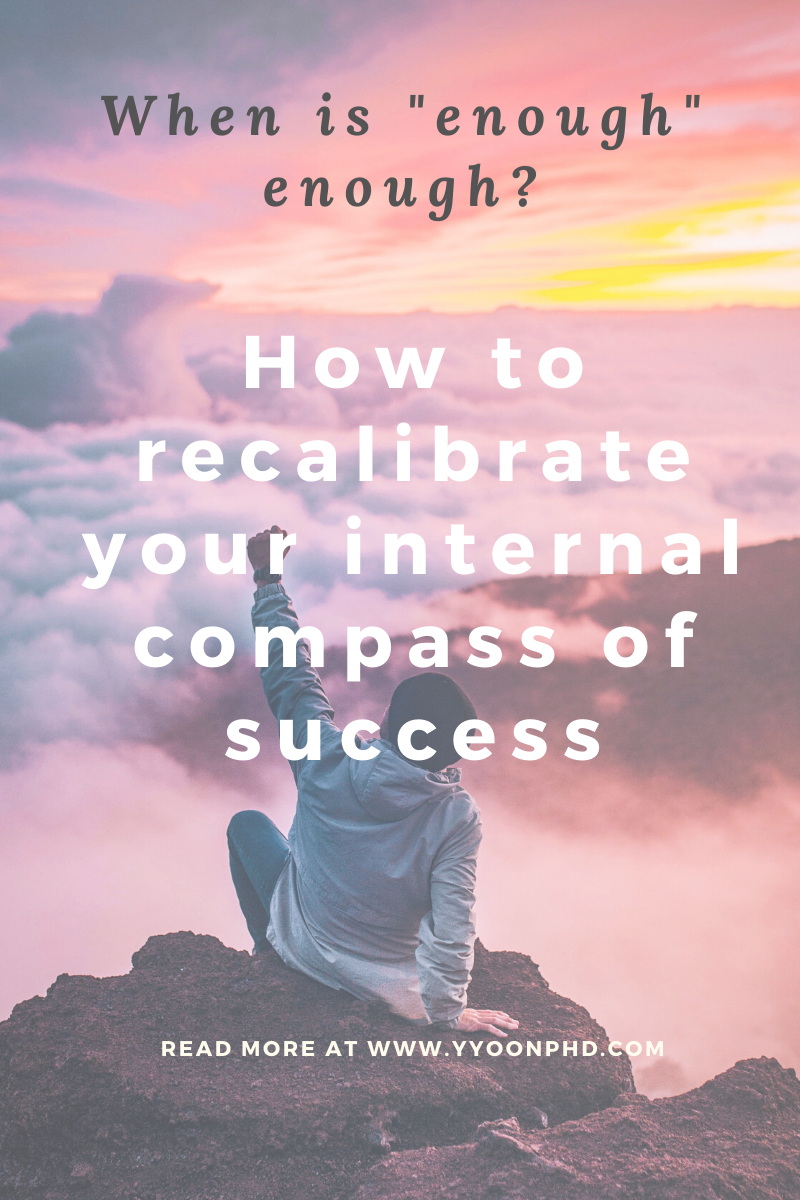When is “enough” enough?
How to recalibrate your internal compass of success
When will I feel good enough?
Have you ever asked yourself this question?
How often do you feel like what you do is not good enough?
Do you get bogged down by a sense of imperfection or inadequacy?
These are hard questions to face. When our minds trap us in this place of not feeling good enough, and if these thoughts and feelings of inadequacy are left to fester, they can lead to feeling stuck, constant fear and anxiety, or depression.
Sometimes there are objective metrics that can help us know if we’re achieving our goals and if something is enough. For example, if you’re supposed to make a certain dollar amount per week, then you know whether or not that goal or marker of success has been more or less achieved. You either make that dollar amount or you don’t (of course there could be other factors at play but I’m simplifying this example for simplicity’s sake…).
Addressing what is on the inside
Today I’m not going to focus on the achievement of these objective markers of success. Instead today let’s talk about the internal metrics of success we use, particularly when you are the type to be an overachiever or a perfectionist.
I’ll address the issues that we face when our internal guides are not so accurate and lead us to feeling “not good enough”. I’ll end with suggestions for things to do and not do to help you readjust your internal compass of success. You can feel good enough. As always, just takes some internal work is all…
Why don’t I ever feel good enough?
For a perfectionist, “good enough” can sometimes feel like a dirty phrase. Being “enough” can sometimes not feel like enough. For a perfectionist or someone who has incredibly high standards, perfect is considered “enough.”
Your current standard of what is “enough” or “successful” is not really based on reality or reasonable metrics. Furthermore, your standards of success may not even be based on your own values and wants. The problem with striving for unrealistically high standards is that you lose sight of what really matters to you or the big picture. We may forget that we’re doing something to achieve a larger mission in our lives - to be fulfilled or to do something meaningful. Instead, we get so bogged down in the details and “can’t see the forest through the trees”.
Also, your high standards and metrics of “good enough” may be based on comparisons to others. I encourage you read more here about the issues that come up when you’re too focused on comparing yourself to others.
Is your sense of being “good enough” based on a feeling?
I often hear people complain that they don’t feel good enough. So that clues me into the fact that a lot of the work we need to do is internal. It’s not necessarily enough that they see the external results and can take in the feedback and feel a sense of accomplishment. If only it were that easy…
What to do when your internal “good enough” meter is broken?
You may gauge your confidence or sense of accomplishment based on a “feeling” of success. But think about this internal gauge kind of like a gauge in a car. If your “feeling” needle of success is always skewed toward the left (meaning failure or “bad”) by default, then what good is this feeling metric? It’s all off!
If your internal gauge of success or feeling “good enough” is broken, then no matter what you put in, you'll always have an inaccurate read on the situation and can lead to not-so-good results. And the not-so-good results are usually at the expense of your own sense of confidence and physical and emotional well being. You will be left to wonder what’s wrong and in the case of most perfectionistic types, probably blame it on your own efforts and say “If I do more then I’ll be good enough!”
All the while, your internal metric is off the entire time. You can see how this is a trap, right?
It’s time to double-check and recalibrate your internal meter!
How to feel like you are good enough
Adopt a more accurate and flexible mindset of success
The needle has spent too much time on the left. And your mind is oriented to only want to go to the far right “Perfect”. The problem is that you’re not leaving a lot of room for all the stuff in between. Change your internal metrics to include a range of what is “enough” rather than only thinking of success or achievement in such binary, all-or-nothing terms.
Do away with seeing everything as Good vs Bad or Perfect vs Failure.
Adopt the “Good Enough” and “Enough for Now” mentality.
Imagine how freeing and gratifying it can be when you have so much more to work with and feel good about?
Get back in touch with your values
When you are back in touch with the big picture values and your “why”, this can recalibrate your internal compass and you can have an easier time being okay with obstacles or feelings of inadequacy. You can have a big picture of what is “enough” instead of getting caught up in the details that don’t mean a lot in the grand scheme of things. You can be less worried about trying to be “perfect” at things that don’t really matter a lot to you.
Remind yourself that you are enough and why you are enough
If your internal meter has been skewed so much to the left, it’ll take some coaching and internal practice to skew it over to the side of feeling ‘enough’ and to get used to what it’s like to believe you’re in that healthy middle ground. What does this look like?
Practice reciting to yourself some affirming and positive statements like:
“I am enough just as I am today”
“I am doing the best I can and that is good enough”
“May I accept this moment as it is”
But what if I don’t believe it?
I always tell my clients: “It’ll feel weird until it doesn’t”.
When you’re trying something new, like telling yourself something you’re not used to believing, it’s going to feel weird. But you keep doing it until it doesn’t. Practice that muscle until it becomes second nature to say “I am enough”.
When you are in the face of adversity or other stressors that challenge that internal sense of being “good enough”, you’ll be more readily able to call upon that forgiving and helpful part of you that reminds you: You are Enough.
Interested in learning more and getting help?
If you are interested in getting help to implement these changes in your life - adopting a healthier mindset and being more compassionate with yourself so you can reach your fullest potential (without burning out!), schedule a phone consultation with me today. I would love to chat with you about what is on your mind and how I can help you!






